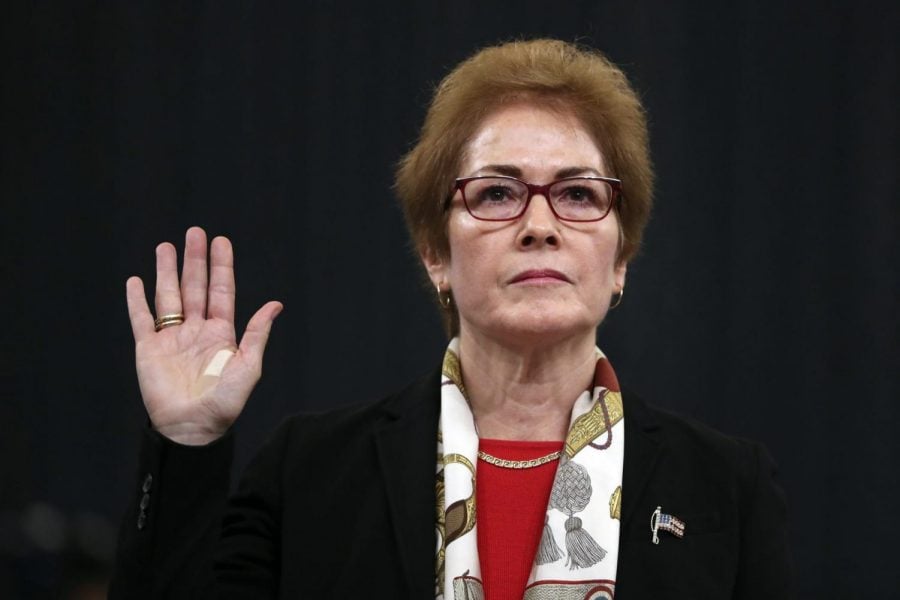Impeachment Inquiry Week in Review Nov. 11 thru Nov. 17
Former Ambassador to Ukraine Marie Yovanovitch testifies before Congress Friday, Nov. 15, 2019.
The impeachment inquiry into President Donald Trump continued this week, with plenty of rancor and partisan rhetoric. Democrats say there is evidence that Trump held up military aid to Ukraine over a sought-after corruption investigation into Joe Biden and his son Hunter, the Democratic Party, and the origins of the 2016 Russia probe. Republicans dispute that there was quid pro quo and say the president has not committed an impeachable offense.
MONDAY, Nov. 11 — Three witness transcripts were released by House committees conducting the impeachment investigation into Trump. Two were from former assistants to Ambassador Kurt Volker, and one was from Laura Cooper, Deputy Assistant Secretary of the Department of Defense.
WEDNESDAY, Nov. 13 — The first public hearings of the impeachment inquiry heard testimony from Bill Taylor, the top U.S. diplomat in Ukraine and Deputy Assistant Secretary of State George Kent. Both largely reiterated what they had said previously in closed-door testimony, the transcripts of which were released weeks ago.
Kent said that over the course of 2018 to 2019, he “became increasingly aware of an effort by Rudy Giuliani and others, including his associates Lev Parnas and Igor Fruman, to run a campaign to smear Ambassador [Marie] Yovanovitch and other officials at the U.S. embassy in Kiyv.” Parnas and Fruman were charged with campaign finance violations related to the Trump’s 2016 presidential campaign in early October.
He described being “alarmed” when Yovanovitch was ousted, which he said “hampered U.S. efforts to establish rapport with the new Zelenskyy administration in Ukraine.” In August he became aware that Giuliani sought to “gin up politically-motivated investigations,” he said, which “were now infecting U.S. engagement with Ukraine, leveraging President Zelenskyy’s desire for a White House meeting.”
Taylor said when he arrived in Kiyv, he found “two channels of U.S. policymaking and implementation, one regular and one highly irregular.” The first included himself, Kent and the National Security Council; the second included the president’s personal lawyer Rudy Giuliani, Chief of Staff Mick Mulvaney, Energy Secretary Rick Perry as well as former Special Envoy to Ukraine Kurt Volker and Ambassador to the European Union Gordon Sondland.
“By mid-July,” he said in prepared testimony, “it was becoming clear to me that the meeting President Zelenskiy wanted was conditioned on the investigation of Burisma and alleged Ukrainian interference in the 2016 U.S. elections.”
Media outlets quickly seized on what appeared to be one of the only new pieces of information from Taylor’s testimony: the fact that a member of Taylor’s staff told him less than a week prior to Wednesday’s hearing that he had overheard Trump ask about “the investigations” on a phone call with Sondland at Kiyv restaurant in July. According to Taylor, Sondland told his staff member that “President Trump cares more about the investigation of Biden” than Ukraine.
That staffer was later reported to be David Holmes. Holmes testified before House investigators behind closed doors Friday.
FRIDAY, Nov. 15 — Marie Yovanovitch, the former ambassador to Ukraine until she was fired by the Trump administration in May, testified at an open impeachment inquiry hearing. She too largely reiterated private testimony that was later released in transcript form by House committees. She defended her record and sought to dispel debunked conspiracy theories that she told former Ukrainian officials who to prosecute. But she also spoke of a crisis within the State Department in which “the policy process is visibly unravelling, leadership vacancies go unfilled, and senior and midlevel officers ponder an uncertain future and head for the doors.”
She said lawmakers should be concerned by the foreign and private interests driving a smear campaign against her.
“Individuals, who apparently felt stymied by our efforts to promote stated U.S. policy against corruption — that is to do the mission — were able to successfully conduct a campaign of disinformation against a sitting ambassador, using unofficial back channels … despite the fact that the State Department fully understood that the allegations were false and the sources highly suspect,” she said.
SATURDAY, Nov. 16 — Transcripts were released from closed door testimony with Jennifer Williams, a special adviser for Europe and Russia to Vice President Mike Pence, and Tim Morrison, a former senior official at the National Security Council. Morrison said NSC legal advisor John Eisenberg told him it was a “mistake” that the transcript of Trump’s July call with Zelenskiy was moved to a highly classified server system typically unusual for such routine calls between heads of state. When asked if he knew why it hadn’t been taken off that server after the third week in September, Morrison said he did not know.
Williams said Pence was asked not to attend the inauguration of President Zelenskiy in May after previously being asked to do so in late April. She also said her notes of the July phone call between Trump and Zelenskiy show that the word “Burisma” was spoken, but it didn’t appear in the transcript summary document the White House released Sept. 25.
SUNDAY, Nov. 17 — House Democrats offered Trump the opportunity to answer questions publicly before Congress or in writing.
THE WEEK AHEAD: Public hearings are scheduled for Lt. Col. Alexander Vindman, Director for European Affairs at the National Security Council, former Ukraine Special Envoy Kurt Volker and Ambassador to the European Union Gordon Sondland.







